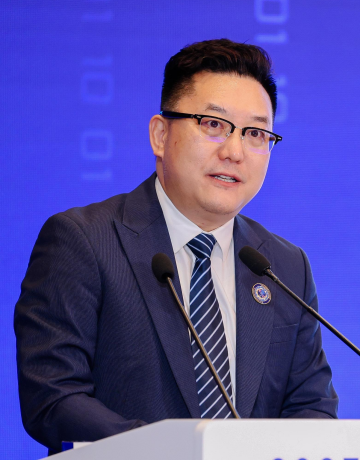From November 6 to 9, the WIC Digital Academy (WICDA) held the 2025 World Internet Conference Global Elite Training (WIC-GET 2025). This initiative was not a routine short-term training session, but rather a strategic initiative focused on global governance in cyberspace.

TAN POH HWEE, President of the Asia Academy of Digital Economy (Singapore)
Concerns over the Digital Divide and the Call of Our Times
In the new era driven by artificial intelligence and big data, digitalization has become a key engine for reshaping the global economy and fueling social transformation. However, this wave of change has not benefited all nations equally. Developed economies, leveraging their technological accumulation and capital advantages, have taken the lead, while many developing countries remain mired in multiple challenges, including technological gaps, weak infrastructure, talent shortages, and lagging governance, hindering their progress in digital transformation. The emergence of the digital divide signifies not only a widening economic gap, but also a reallocation of global development opportunities. The imbalance in digital capabilities is gradually solidifying into a new, deep-seated form of global structural inequality.
China is not merely an advocate of the vision of "building a community with a shared future in cyberspace" but also a pioneer in its practice. It is at this critical historical juncture that the WICDA launched the "World Internet Conference Global Elite Training". As the Digital Academy's flagship annual capacity-building initiative, this program focuses on the digital economy and sustainable development, using educational cooperation and capacity co-development as strategic pillars to pave a "new pathway" for developing nations toward a digital civilization.
Bridging with Talent: Forging a Global Mechanism for "Digital Shared Prosperity"
The mission of the WICDA has transcended the scope of traditional education. It represents a new paradigm in global cyberspace governance, using talent as the core link to assist developing countries in transitioning from being "digitally disadvantaged" to becoming "co-creators in the digital landscape". While facilitating the sharing of knowledge and experience, it aims to cultivate endogenous drivers for independent innovation and sustainable development, ultimately addressing the fundamental challenges faced by developing nations in the digital domain.
Over the past year, the WICDA has successfully conducted multiple specialized training programs, including the "Digital Silk Road Cross-Border E-commerce Training", "Advanced Training on Digital Economy Innovation and Development", "WICDA Cybersecurity Emergency Response Advanced Training Program", and the "Cultural Heritage Digital Preservation Training Program". These initiatives have not only enhanced the digital governance capacities of participating countries but have also enabled the Chinese approach of "empowerment through education, co-construction of technology, and win-win cooperation" to take root globally. Participants of the current World Internet Conference Global Elite Training hail from countries and regions such as Costa Rica, Tajikistan, Saudi Arabia, Sierra Leone, Tanzania, Sri Lanka, Indonesia, Côte d'Ivoire, Brazil, and the Netherlands. Most of them are key designers and implementers of digital-economy strategies. The curriculum focuses on core issues such as AI governance, cross-border data flows, digital economy regulations, and cybersecurity, designed to help participants deeply understand the underlying logic of international rule-making and achieve effective integration of global perspectives with local practices.
As a scholar who has previously lectured in these programs, I deeply appreciate the strategic value of this initiative–it goes beyond conventional teaching and constitutes a systematic capacity-building effort. Within the current global digital governance landscape, talent is the critical variable for overcoming resource constraints and institutional barriers. The profound value of this program lies in its ability to use the "talent chain" to drive the "innovation chain", empower the "industry chain", and reshape the "value chain", thereby transforming developing countries from bystanders in digital competition into active participants in rule-making.
Starting from Wuzhen: Co-creating a Brighter Future for Human Digital Civilization
Digital transformation is not a solitary journey, but a shared endeavor. The Wuzhen Summit stands as a vivid testament to this belief–here, the World Internet Conference, with its open and inclusive approach, propels global digital cooperation from "technology sharing" towards "rule-making". From the construction of submarine fiber-optic cables in Africa, to the cultivation of digital talent in ASEAN, and to cross-border data governance practices in Central Asia, a digital cooperation network with China as a hub, radiating across the globe, is taking shape. As I have stated before, China is not only contributing its technological expertise but also providing "institutional public goods" for the stable development of the world's digital economy through conceptual innovation and institutional design.
This training program is a concrete embodiment of that vision–it translates digital capacity building from a concept into replicable, actionable and sustainable models of international cooperation. Like the murmuring streams of this millennia-old water town, digital civilization is quietly flowing across the world–destined to connect every nation and people yearning for progress. The future world should not be fragmented by technology, but connected by wisdom. This collective talent-nurturing initiative in Wuzhen is now converging the light of knowledge, the light of cooperation, and the light of progress, illuminating the path forward to a new era of digital civilization and shaping a more balanced, equitable, and open digital future.
By TAN POH HWEE, President of the Asia Academy of Digital Economy (Singapore)
Copyright ©1997- by CRI Online All rights reserved